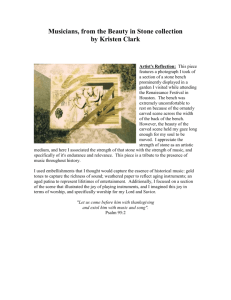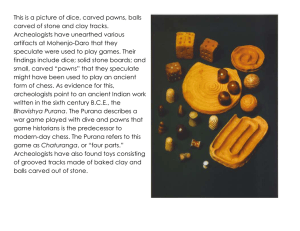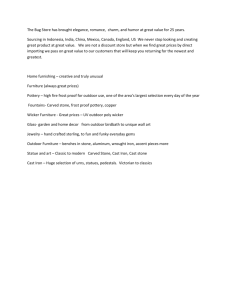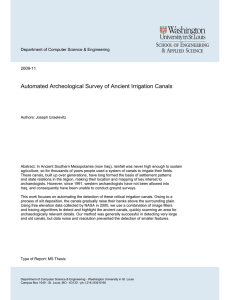1. ASOIAF Sample 1
advertisement
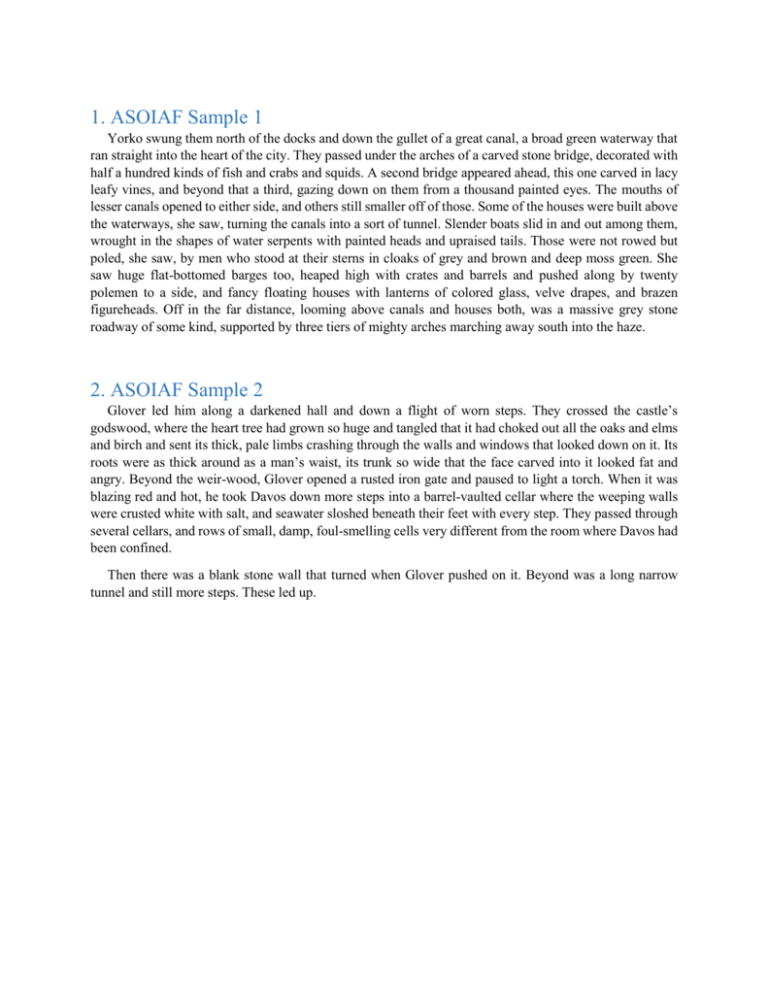
1. ASOIAF Sample 1 Yorko swung them north of the docks and down the gullet of a great canal, a broad green waterway that ran straight into the heart of the city. They passed under the arches of a carved stone bridge, decorated with half a hundred kinds of fish and crabs and squids. A second bridge appeared ahead, this one carved in lacy leafy vines, and beyond that a third, gazing down on them from a thousand painted eyes. The mouths of lesser canals opened to either side, and others still smaller off of those. Some of the houses were built above the waterways, she saw, turning the canals into a sort of tunnel. Slender boats slid in and out among them, wrought in the shapes of water serpents with painted heads and upraised tails. Those were not rowed but poled, she saw, by men who stood at their sterns in cloaks of grey and brown and deep moss green. She saw huge flat-bottomed barges too, heaped high with crates and barrels and pushed along by twenty polemen to a side, and fancy floating houses with lanterns of colored glass, velve drapes, and brazen figureheads. Off in the far distance, looming above canals and houses both, was a massive grey stone roadway of some kind, supported by three tiers of mighty arches marching away south into the haze. 2. ASOIAF Sample 2 Glover led him along a darkened hall and down a flight of worn steps. They crossed the castle’s godswood, where the heart tree had grown so huge and tangled that it had choked out all the oaks and elms and birch and sent its thick, pale limbs crashing through the walls and windows that looked down on it. Its roots were as thick around as a man’s waist, its trunk so wide that the face carved into it looked fat and angry. Beyond the weir-wood, Glover opened a rusted iron gate and paused to light a torch. When it was blazing red and hot, he took Davos down more steps into a barrel-vaulted cellar where the weeping walls were crusted white with salt, and seawater sloshed beneath their feet with every step. They passed through several cellars, and rows of small, damp, foul-smelling cells very different from the room where Davos had been confined. Then there was a blank stone wall that turned when Glover pushed on it. Beyond was a long narrow tunnel and still more steps. These led up. 3. Three Days to See – Hellen Keller All of us have read thrilling stories in which the hero had only a limited and specified time to live. Sometimes it was as long as a year; sometimes as short as twenty four hours. But always we were interested in discovering just how the doomed man chose to spend his last days or his last hours. I speak, of course, of free men who have a choice, not condemned criminals whose sphere of activities is strictly delimited. Such stories set us thinking, wondering what we should do under similar circumstances. What events, what experiences should we crowed in those last hours as moral beings? What happiness should we find in reviewing the past, what regrets? Sometimes I have thought it would be an excellent rule to live each day as if we should die tomorrow. Such an attitude would emphasize sharply the values of life. We should live each day with gentles, a vigor, and a keenness of appreciation which are often lost when time stretches before us in the constant panorama if more days and months and years to come. There are those, of course, who would adopt the epicurean motto of ‘Eat, drink, and be merry,’ but most people would be chastened by the certainty of impending death. In stories, the doomed hero is usually saved at the last minute by some stoke of fortune, but almost always his sense of values is changed. He becomes more appreciative of the meaning of life and its permanent spiritual values. It has often been noted that those who live, or have lived, in the shadow of death bring a mellow sweetness to everything they do. Most of us, however, take life for granted. We know that one day we must die, but usually we picture that day as far in the future. When we are in buoyant health, death is all but unimaginable. We seldom think of it. The days stretch out in endless vista. So we go about our pretty tasks, hardly aware of our listless attitude toward life. The same lethargy, I am afraid, characterizes the use of all our faculties and senses. Only the deaf appreciate hearing, only the blind realize the manifold blessing that lie in sight. Particularly does this observation apply to those who have lost sight and hearing in adult life. But those who have ever have never suffered impairment of sight or nearing seldom make the fullest use of these blessed faculties. Their eyes and ears take in all sights and sounds hazily, without concentration, and with little appreciation. It is the same old story of not being grateful for what we have until we lose it, of not being conscious of health until we are ill. 4. In memory yet green, in joy still felt, The screens of life rise sharply into view. We triumph; Life’s disasters are undealt, And while all else is old, the world is new.

